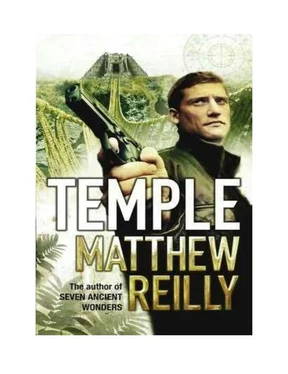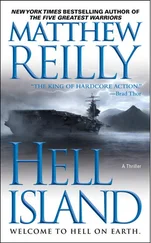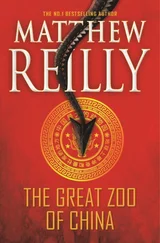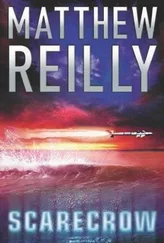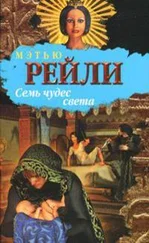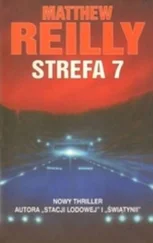Corporal Buzz Cochrane appeared to be in his late thir ties. He had red hair and eyebrows, a thickly creased face and a rough unshaven chin. He was also a big man—bulky across the chest—with thick, powerful arms.
Just from the look of him, Race didn’t like him.
There just seemed to be something mean-spirited about him—the not-so-intelligent school bully who by the sheer virtue of his size had had it over the other kids. The kind of brute who had joined the Army because it was a place where people like him thrived. It was no wonder he was almost forty and still a corporal.
‘Say, Doogie,’ Cochrane said suddenly, ‘what do you say I go over there and tell that cute little archaeologist that we got ourselves a dumb young soldier over here who’d like to ask her out for a burger and a movie—’
“No!” Doogie exclaimed, genuinely alarmed.
The other Green Berets burst out laughing.
Doogie went red in the face of their laughter.
‘And don’t call me dumb,’ he muttered. ‘I ain’t dumb.’
Just then, Van Lewen and Scott returned from the other chopper. The soldiers’ laughter stopped immediately.
Race saw Van Lewen look warily from Doogie to the others, in the way a big brother would glare at his little brother’s tormentors. He got the impression that it was more because of Van Lewen’s presence than Captain Scott’s that the laughter had ceased.
‘How’re things progressing here?’ Scott said to Cochrane.
‘Not a problem in the world, sir,’ Cochrane said.
‘Then grab your gear and head on into the village,’ Scott said. ‘They’re about to do the test.’
Race and the soldiers came into the village proper. It was still pouring with rain.
As he walked down the muddy street, Race saw Lauren standing with Troy Copeland over by the largest of all the Samsonite trunks.
It was a great big black case, at least five feet tall, and Copeland was unfolding its side panels, transforming it into a portable workbench of some sort.
The lean scientist flipped open the lid of the trunk, revealing a waist-high console made up of some dials, a keyboard and a computer screen. Beside him, Lauren was attaching a silver rod-like object that looked like a boom microphone onto the top of the console.
‘Ready?’ Lauren asked.
‘Ready,’ Copeland said.
Lauren flicked a switch on the side of the Samsonite trunk and instantly green and red lights lit up all over the console.
Copeland immediately set to work typing on the unit’s all-weather keyboard.
‘It’s called a nucleotide resonance imager, or NRI,’ Lau-ten told Race before he could ask. ‘It can tell us the location of any nuclear substance in the surrounding area by measuring the resonance in the air around that substance.’
“Say what?’ Race said.
Lauren sighed and then said, ‘Any radioactive substance—be it uranium, plutonium or thyrium—reacts with oxygen at a molecular level. Basically, the radioactive substance causes the air around it to vibrate, or resonate. This device detects that resonance in the air, and hence gives us the location of the radioactive substance.’
A moment later, Copeland finished typing. He turned to Nash. ‘NRI’s ready.’
‘Do it,’ Nash said.
Copeland hit a key on the keyboard and immediately the silver rod mounted on top of the machine began to rotate. It moved slowly, in a steady, measured circle.
As it did so, Race looked about himself and noticed that Lopez and Chambers had returned from their exploring.
Now they were staring intently at the machine. Race looked at the rest of the team around him—everyone was staring intently at the nucleotide resonance imager.
And then suddenly it dawned on him.
This was what everything depended on.
If the imager didn’t detect the idol somewhere in the immediate vicinity, then they had all wasted their time coming here—
The rod on top of the imager stopped turning.
‘We have a reading,’ Lauren said suddenly, her eyes locked on the console’s screen.
Race saw Nash let out the breath he’d been holding.
‘Where?’
‘One second…’ Lauren typed something on the keyboard.
The rod on the imager was now pointing upriver— toward the mountains—toward the area where the trees of the rainforest met the sheer face of the nearest rocky plateau.
Lauren said, ‘The signal’s weak because the angle’s not right. But I’m picking up something. Let me see if I can adjust the vector some…’
She hit some more keys and the rod on top of the unit slowly began to tilt upwards. It had reached an angle of about thirty degrees when suddenly Lauren’s eyes lit up.
‘All right,’ she said. ‘Strong signal. Very high frequency resonance.
Bearing 270 degrees—due west. Vertical angle is 29 degrees, 58 minutes. Range… 793 metres.’
Lauren looked up at the dark rocky mountain face that rose above the trees to the west. It looked like a plateau of some sort. Slanting sheets of rain whipped across its face.
‘It’s somewhere in there,’ she said. ‘Somewhere up in the mountains.
Nash turned to Scott. ‘Get on the radio to Panama. Tell them that the preliminary team has verified the existence of the substance. But also say that we have intel on hostile forces en route to our location as we speak. Tell them to send in a full protective force for extraction as soon as they can.’
Nash spun to face the rest of the assembled group. ‘All right, folks, saddle up. Let’s go get that idol.’
Everyone started getting ready.
The Green Berets readied their M-16s. The DARPA scientists grabbed compasses and various computer equipment to take with them.
Race saw Lauren and Troy Copeland head inside one of the Hueys, presumably to grab some gear of their own. He hurried after them to see if he could help—and while he was at it, maybe also to ask Lauren what Nash had meant when he’d said that hostile forces were on their way to Vilcafor.
‘Hey—’ Race said as he arrived in the doorway of the chopper. ‘Oh…’
He’d caught the two of them in a clinch—kissing like a pair of teenagers—hands through each other’s hair, tongues in each other’s mouths. Hot to trot.
Upon Race’s unexpected arrival, the two scientists separated instantly. Lauren blushed. Copeland scowled.
‘I’m… really sorry,.’ Race said. ‘I didn’t mean to’
‘It’s okay,’ Lauren said, pushing her hair back into place.
‘This is just a very exciting moment for us.’
Race nodded, turned away, headed back into the village.
Obviously.
What he couldn’t help thinking about, however, as he walked back to join the others in the village, was the image of Lauren running her fingers through Copeland’s hair as she kissed him. He had seen her wedding ring clearly.
Copeland, on the other hand, hadn’t been wearing one.
The group walked along the remains of a muddy path that ran along the edge of the riverbank. They were heading toward the base of the rocky mountain-plateau, the sounds of the nighttime forest loud in their ears. The sea of leaves around them rippled under the weight of the steady rain.
It was dark now and the beams of their flashlights played across the forest. As he walked, Race noticed some gaps in the dark storm clouds above them—gaps which allowed the odd shaft of brilliant blue moonlight to illuminate the river beside them. Occasionally in the distance he would see the strobelike flash of lightning. A storm was coming.
Lauren and Copeland led the way. Lauren held a digital compass out in front of her. Walking alongside her, his M-16 held across his chest, was her bodyguard, Buzz Cochrane.
Nash, Chambers, Lopez and Race followed close behind them. Scott, Van Lewen and a fourth soldier—the chunky corporal named Chucky Wilson—brought up the rear.
Читать дальше
